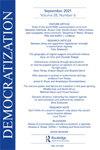证券化,恐惧政治,以及竞争性威权政体中反对派联盟的形成
IF 2.9
1区 社会学
Q1 POLITICAL SCIENCE
引用次数: 1
摘要
本文章由计算机程序翻译,如有差异,请以英文原文为准。
Securitization, fear politics, and the formation of an opposition alliance in competitive authoritarian regimes
ABSTRACT This article examines how opposition parties with diverse ideologies can form alliances in competitive authoritarian regimes despite the securitization strategy used by authoritarian incumbents. Using Turkey as a case study, the article demonstrates that an authoritarian leader may associate terrorism with opposition parties and may disseminate this fear to manipulate moderate voters and prevent coalition formation between niche parties. By analysing public speeches of political actors in Turkey, the study argues that if opposition parties recognize the vulnerabilities of the regime and believe that forming an alliance would gain support from the masses and encourage cross-party voting, then the securitization strategy would not deter them from forming a pre-electoral alliance. However, the failure of the securitization strategy to prevent opposition parties from forming an alliance does not guarantee opposition victory in elections. The securitization strategy employed by the authoritarian regime can still be utilized to effectively empower the authoritarian leader, enabling them to win elections by capitalizing on fear and depicting the opposition alliance as a security threat and a potential source of instability if they were to come into power.
求助全文
通过发布文献求助,成功后即可免费获取论文全文。
去求助
来源期刊

Democratization
POLITICAL SCIENCE-
CiteScore
6.40
自引率
12.50%
发文量
73
期刊介绍:
Democratization aims to promote a better understanding of democratization - defined as the way democratic norms, institutions and practices evolve and are disseminated both within and across national and cultural boundaries. While the focus is on democratization viewed as a process, the journal also builds on the enduring interest in democracy itself and its analysis. The emphasis is contemporary and the approach comparative, with the publication of scholarly contributions about those areas where democratization is currently attracting considerable attention world-wide.
 求助内容:
求助内容: 应助结果提醒方式:
应助结果提醒方式:


